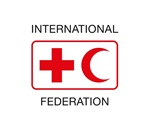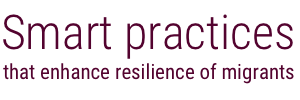Provision of first aid training and basic training on community health to vulnerable migrant groups and host communities.
The Jordan National Red Crescent Society provides basic knowledge of community health to vulnerable populations in the country including Syrians, Iraqis, and Jordanians. The influx of migrants into Jordan has placed a burden on the health system. Pre-existing conditions, poor living conditions and lack of information contributed to increase health issues among migrant populations. For example, Syrian adults have generally higher rates of coronary issues and diabetes. Furthermore, there is limited capacity to manage these diseases at primary health care level. In addition, poor quality housing, overcrowded living conditions and limited access to water are contributing to disease.
To help combat these issues, the community-based health programme empowers volunteers and communities with simple tools adapted to the local contexts to take charge of their health. Community members are provided with knowledge and skills to improve their understanding of health and are encouraged to engage in behavioural change to reduce health risks. Information is also provided to prevent and manage minor health issues in the household, and to understand when and where to seek medical assistance.
The Thai Red Cross Society provides first aid training for migrants in camps on the border of Myanmar and Thailand. The programme does not involve a community-based health component.
The programme has served over 64,264 beneficiaries across four branches in 2015.
Design. [P1] Focuses on the needs and vulnerabilities of migrants. [P2] Integrates migrants in humanitarian programmes.
Implementation. [P3] Includes migrants in provision of their own first aid and health programming.
Programme. [P9] Responds to displacement of populations at the border.
- It is difficult to find and retain volunteers willing to provide community health training for a long period.
- Cultural differences led to divergences on the meanings of some key terms, causing some confusion.
- Low transportation allowances caused volunteers to leave and join other community-based health and first aid programmes.
- Monitoring is important: in 2016 the Jordan National Red Crescent Society used open data kits on tablets to report on the Community Health Volunteer programme.
Smart practices
Smart practices report and database survey
About the report
People migrate in pursuit of a better life for themselves and their families. As described in the International Federation of Red Cross and Red Crescent Societies’ (IFRC) Policy on Migration, “migrants are persons who leave or flee their habitual residence to go to new places – usually abroad – to seek opportunities or safer and better prospects.
Read more
About the International Federation

